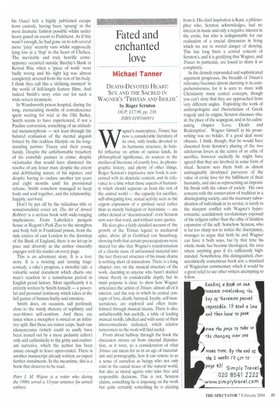Fated and enchanted love
Michael Tanner
DEATH-DEVOTED HEART: SEX AND THE SACRED IN WAGNER'S 'TRISTAN AND ISOLDE' by Roger Scruton OUP, .£17.99, pp. 238, ISBN 0195166914 Wagner's masterpiece, Tristan, has now a considerable literature of its own, with books devoted to its harmonic structure, its baleful influence on artists of various kinds, its philosophical significance, its sources in the mediaeval literature of courtly love, its phonographic histoty, and plenty of other things. Roger Scruton's impressive new book is concerned with its dramatic content, and its relevance to a time when those aspects of humanity which should separate us from the rest of the animal world — the capacity for sacrifice, self-abnegating love, sexual activity seen as the urgent expression of a spiritual need rather than as merely biological or hedonistic — are either denied or 'deconstructed': even Scruton now uses that word, and without scare quotes.
He does give a fairly detailed account of the growth of the Tristan legend in mediaeval epics, above all in Gottfried von Strassburg, showing both that certain preoccupations were shared but also that Wagner's transformation of a chaotic mass of unfocussed material into the taut three-act structure of his music drama is nothing short of miraculous. There is a long chapter, too, on the musical structure of the work, daunting to anyone who hasn't studied music theory in considerable depth; but its main purpose is clear, to show how Wagner articulates the action of Tristan, almost all of it interior, and the way in which its central concepts of love, death, betrayal, loyalty, self-transcendence, are explored and often transformed through musical means. There is also, unfashionably but usefully, a table of leading musical motifs, labelled and with some of their interconnections indicated, which relative newcomers to the work will find useful.
From about halfway through the book the discussion moves on from internal illumination, as it were, to a consideration of what Tristan can mean for us in an age of materialism and pornography, how it can restore to us a sense of ourselves as beings who not only exist in the causal nexus of the natural world, but also as moral agents who take free and responsible decisions. This is not, Scruton claims, something he is imposing on the work but quite certainly something he is eliciting from it. His chief inspiration is Kant, a philosopher who, Scruton acknowledges, had no interest in music and only a negative interest in the erotic, but who is indispensable for our realisation of a crucial dimension in living which we are in mortal danger of denying. This has long been a central concern of Scruton's, and it is gratifying that Wagner, and Tristan in particular, are found to share it so completely.
As the densely expounded and sophisticated argument progresses, the breadth of Tristan's relevance becomes almost alarming in its comprehensiveness, for it is seen to share with Christianity many central concepts, though you can't deny that they are approached from very different angles. Exploiting the work of anthropologists and theoreticians of Greek tragedy and its origins, Scruton discusses ritual, the place of the scapegoat, and in his culminating chapter 'Love, Death and Redemption'. Wagner himself in his prosewriting was no bolder, if a good deal more obscure. I think, though, that he would have dissented from Scruton's placing of the two adulterous lovers at the centre of an ethic of sacrifice, however excitedly he might have agreed that they are involved in some form of ritual. Scruton sees them both as almost unimaginably developed purveyors of the value of erotic love for the fulfilment of their humanity, and also as representing an impossible break with the values of society. His own concern with the conservation of tradition in a disintegrating society, and the necessary subordination of individuals in its service, is surely in the sharpest conflict with Wagner's hyperromantic, scandalously revolutionary espousal of the religion rather than the ethic of limitless expansion of the self. Somehow Scruton, who is far too sharp not to notice the discrepancy, manages to argue that both he and Wagner can have it both ways, but by that time his whole mode has become theological, the area where anything goes if it's sufficiently highminded. Nonetheless, this distinguished, characteristically contentious book sets a standard of Wagnerian commentary which it would be a great relief to see other writers attempting to follow.


























































 Previous page
Previous page